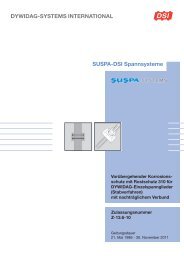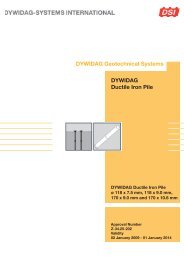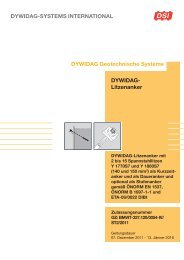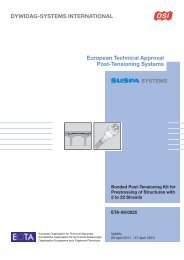The DSI Spirit - Dywidag Systems International GmbH
The DSI Spirit - Dywidag Systems International GmbH
The DSI Spirit - Dywidag Systems International GmbH
- No tags were found...
Create successful ePaper yourself
Turn your PDF publications into a flip-book with our unique Google optimized e-Paper software.
Contents<strong>The</strong> <strong>DSI</strong> <strong>Spirit</strong> –<strong>DSI</strong> Group Codeof Conduct050607070707080910111214161820222424262830323234CEO’s Message<strong>The</strong> <strong>DSI</strong> <strong>Spirit</strong>Why the <strong>DSI</strong> <strong>Spirit</strong> and why is it important for all of us?Who is responsible?Who needs to comply?What does it mean for you?Getting AdviceAnnual Certificate of Compliance<strong>The</strong> <strong>DSI</strong> <strong>Spirit</strong> in SummaryBusiness IntegrityLegal ComplianceCompetition LawConflicts of InterestGifts and EntertainmentImproper PaymentsCorporate GovernanceEmployee ResponsibilityRespect for the IndividualHealth and SafetyProtecting the EnvironmentCustomer and Supply Chain ResponsibilitiesCommunity and Social AwarenessLocal CommunitiesPolitical Contributions<strong>DSI</strong> GroupAntitrust Policyand Guidance37383839394041424344454647484850CEO’s MessageAntitrust PolicyAntitrust Law<strong>DSI</strong> PolicyReportingGuidance on Contact with CompetitorsIntroductionGuideline OneGuideline TwoGuideline ThreeGuideline FourGuideline FiveGuideline SixSeek Legal Advice<strong>DSI</strong> LawyersPhone Numbers “Speak up”
<strong>The</strong> <strong>DSI</strong> <strong>Spirit</strong> – <strong>DSI</strong> Group Code of Conduct4
<strong>The</strong> <strong>DSI</strong> <strong>Spirit</strong> – <strong>DSI</strong> Group Code of ConductCEO’s MessageTrust and integrity are essential for any business. If our customers, our shareholders, our suppliers, ourbusiness partners and our communities didn’t trust us as a company and as individuals, and didn’ttrust the quality of our operations, systems and products, then we would soon be out of business.<strong>The</strong> sure way to gain and keep people’s trust is to comply with the regulations that govern our industry,with the laws that apply in every country in which we operate, with our own policies and standards andto behave in keeping with our own and recognised industry values. Doing business competitively andaiming for excellence and leadership is essential for our success. Doing business with integrity is just asimportant. That is ”the <strong>DSI</strong> <strong>Spirit</strong>”.As we look to grow the <strong>DSI</strong> business into new markets and territories, every day we face newchallenges and are presented with new opportunities. In tackling these challenges and taking theopportunities we must make the right decisions and take the right actions – this doesn’t just mean wedo what is right financially – it also means we do the right thing ethically and with integrity.I ask and expect each person in the <strong>DSI</strong> Group to make a personal commitment to follow the <strong>DSI</strong> Codeof Conduct/Ethics – we have called this ”the <strong>DSI</strong> <strong>Spirit</strong>”. This contains a set of policies on key integrityissues – it is there to guide all of us in upholding our ethical commitment.All <strong>DSI</strong> employees – wherever they live and work in the world – must comply, not only with the letter ofthese policies, but also with their spirit. That means:Everyone. Every day. Everywhere.Patrik Nolåker<strong>DSI</strong> Group CEO5
<strong>The</strong> <strong>DSI</strong> <strong>Spirit</strong> – <strong>DSI</strong> Group Code of Conduct<strong>The</strong> <strong>DSI</strong> <strong>Spirit</strong><strong>DSI</strong> is committed to meeting the expectationsof customers and consumers by conductingits business in a sustainable way – responsiblyand with integrity. We believe our activitiesshould generate economic benefits, createopportunities for enhanced quality of life,respect the environment, and be a positiveinfluence in the communitiesin which we operate.<strong>The</strong> integrity and ethics of <strong>DSI</strong> are capturedin the <strong>DSI</strong> <strong>Spirit</strong>. By adhering to thestandards set out in the <strong>DSI</strong> <strong>Spirit</strong>, in eachof its five sections:• Business Integrity• Employee Responsibility• Protecting the Environment• Customer and Supply ChainResponsibilities• Community and SocialAwarenesswe will be helping to build asuccessful, world class companythat we can truly be proud of.6
<strong>The</strong> <strong>DSI</strong> <strong>Spirit</strong> – <strong>DSI</strong> Group Code of ConductWhy the <strong>DSI</strong> <strong>Spirit</strong>and why is it important for all of us?Who is responsible?<strong>The</strong> <strong>DSI</strong> Board of Directors has overall responsibilityfor the <strong>DSI</strong> <strong>Spirit</strong>, and, each year, the Head of Legaland the CFO will make a report to the Board on theoperation and its effectiveness worldwide.Within each Business Unit, the Regional BusinessCEO with the support of his executive team and theHead of Legal is responsible for introducing the <strong>DSI</strong><strong>Spirit</strong> and for ensuring compliance.Who needs to comply?We all do – the <strong>DSI</strong> <strong>Spirit</strong> applies to all <strong>DSI</strong> employeesworldwide, including those employees workingin each of <strong>DSI</strong>’s businesses and subsidiaries,businesses in which <strong>DSI</strong> holds a controlling interest,and all individual contractors working full-time for <strong>DSI</strong>.We also expect our business partners and all thirdparties acting for <strong>DSI</strong>, or in the name of <strong>DSI</strong>, to befamiliar with and to comply with the <strong>DSI</strong> <strong>Spirit</strong>.What does it mean for you?We appreciate that not every section will apply toeveryone in his/her current job. However, it is essentialthat you have an awareness of the whole <strong>DSI</strong> <strong>Spirit</strong>,and that you thoroughly understand all the sectionsthat apply to you personally.By defining minimum standards and offeringexamples of what those standards mean in practice,the <strong>DSI</strong> <strong>Spirit</strong> has been designed to act as a first pointof reference for any situation you might find yourselfin. If you are unsure about how it applies, a goodstarting point is to ask yourself some key questions:• Is this activity illegal?• Could it cause any harm or loss to you, yourcolleagues, the company, people doing businesswith us, or members of the public?• Would you feel awkward if you had to tell yourmanager about it?• Would it be embarrassing for you if your colleagues,family and friends found out about it?• Would it be embarrassing for <strong>DSI</strong> if an account ofthe activity appeared in the newspapers or the newson TV?If the answer to any of these questions is ”yes” thenthe <strong>DSI</strong> <strong>Spirit</strong> is almost certainly being violated.Remember that an action can just as easily besomething said as something done.If you are still not sure, then you need to getclarification. Talk to your line manager, or your localhuman resources contact or a <strong>DSI</strong> in-house lawyer.If you are a line manager and are unsure what adviceto give one of your employees, you should raise thematter with your own manager.Violations of the <strong>DSI</strong> <strong>Spirit</strong> are serious matters. <strong>The</strong>ymay result in disciplinary action being taken againstthose involved, including the possibility of dismissal.If the law is being broken, criminal charges could bebrought, and you may well be fined personally.7
<strong>The</strong> <strong>DSI</strong> <strong>Spirit</strong> – <strong>DSI</strong> Group Code of ConductGetting AdviceNo one expects you to be an expert on all laws and regulations. <strong>DSI</strong> wantsyou to be aware of the issues raised in the <strong>DSI</strong> <strong>Spirit</strong>, and to take the initiativeto get advice and to report potential violations of law and the <strong>DSI</strong> <strong>Spirit</strong>.If you have reason to believe the <strong>DSI</strong> <strong>Spirit</strong> is being violated, or is aboutto be, it is essential that you bring the matter to the attention of yourline manager, or any senior manager, immediately. If you feel you areunable to do this, you can use our confidential ‘whistleblowing’Speak Up phone line or web based service.Don’t feel embarrassed about speaking up. Even if it turns outthat you were mistaken about your suspicions, you will not bepenalized for raising concerns if you were acting in good faith.It is a matter of policy for <strong>DSI</strong> to support open and fair discussionof issues and worries. And remember, by highlighting apossible breach of the <strong>DSI</strong> <strong>Spirit</strong> at the earliest opportunity,you might very well be preventing the escalation of a lessserious matter into a very serious one –helping the people involved.<strong>The</strong>re will be no retaliation or consequences for askingadvice or making an honest report.Remember to“Speak Up”Contact details for for “Speak Up ““Speak (phone numbers Up “ on page 50of (phone this brochure) numbers and web addressesare available separately)8
<strong>The</strong> <strong>DSI</strong> <strong>Spirit</strong> – <strong>DSI</strong> Group Code of ConductAnnualCertificate of ComplianceCertain senior employees will be required at the end ofeach year to sign an Annual Certificate of Compliancestating that they have read the <strong>DSI</strong> <strong>Spirit</strong> and havetaken steps to ensure that they, their direct reports andthe parts of the business they are responsible for haveconducted business responsibly, and in compliancewith laws and regulations and the <strong>DSI</strong> <strong>Spirit</strong>.9
<strong>The</strong> <strong>DSI</strong> <strong>Spirit</strong> – <strong>DSI</strong> Group Code of Conduct<strong>The</strong> <strong>DSI</strong> <strong>Spirit</strong>in SummaryDon’t break the lawThis is a minimum requirement expected of every <strong>DSI</strong> employee in every country in which we operate.<strong>The</strong>re are no exceptions.Don’t compromise your integrityNever exploit your position at <strong>DSI</strong> to obtain a benefit or advantage for yourself, your family or your friends.Be careful with giftsNever offer, or accept, gifts or entertainment of a value that might be thought by others to influence therecipient’s business judgement.Never bribe or be bribedWhether offered or received, any form of unauthorised payment – in cash or in kind – intended to winimproper advantage is strictly prohibited and may well be illegal.Don’t intentionally misleadNever try to falsify any records, financial or otherwise.Respect your colleaguesAny form of discrimination on the basis of an individual’s race, colour, religion, gender, age, marital status,sexual orientation or disability is fundamentally unacceptable, as is any form of bullying or harassment.Keep everybody safeHealth and safety regulations and procedures are designed to protect youand your colleagues. Follow them at all times.Protect the planetTake every opportunity to put environmental stewardship into practice – protect the environment,conserve energy and eliminate waste.Respect our business relationshipsAlways treat our customers and suppliers fairly.Be a good neighbourGet involved and build long term relationships with our local communities.If in doubt, askIf you are unsure about a particular application of the <strong>DSI</strong> <strong>Spirit</strong>, or you believe it is being violated, talk toyour line manager, or your local human resources contact or a <strong>DSI</strong> in-house lawyer. If there is a reasonwhy you can’t do that, use the Speak Up phone line or web based service.10
<strong>The</strong> <strong>DSI</strong> <strong>Spirit</strong> – <strong>DSI</strong> Group Code of ConductBusiness IntegrityIntegrity is a general term for living by a setof values or beliefs. Business integrity, fora <strong>DSI</strong> employee, means fulfilling yourresponsibilities in accordance with thevalues embodied in the <strong>DSI</strong> <strong>Spirit</strong>.It means that you are accountablefor your own actions and for theeffect they have on the company,your colleagues, our customersand suppliers, and the widercommunity.Business integrity hasimplications in a numberof different areas.11
<strong>The</strong> <strong>DSI</strong> <strong>Spirit</strong> – <strong>DSI</strong> Group Code of ConductLegal Compliance – Scenarios• Juan Pablo is aware that the local laws governingequipment inspection at his site are in the process ofbeing revised. As things stand, <strong>DSI</strong> will be in breachof these new laws if he doesn’t revise his inspectionprocedures. However, he feels sure that the lawswon’t be enforced and, anyway, he is convinced thatthe current procedures are entirely safe. <strong>The</strong>re isalso the important matter of the additional downtimethat complying with the new laws will cause. ButJuan Pablo also knows that he has no choice but tocomply.• Annabelle is delighted that the new product line sheis responsible for is proving so successful. However,in order to meet the demand, the production staff areworking overtime in excess of the legal limit. <strong>The</strong> staffare not complaining, they welcome the extra moneythey are making, and hiring additional permanentstaff could prove costly if demand is not maintained.However, even though the staff won’t like it, she hasto do something to reduce the amount of overtimethey are working, and comply with the legal limit.• Peter is visiting a potential new supplier of steelproducts based in China. <strong>The</strong> prices being offeredby the supplier are 40 % cheaper than equivalentproducts we buy today. However, Peter notices thata lot of the workers in the factory look under age. Hequestions the managing director of the supplier whoconfirms that they do use child labour for some jobsas it ”keeps the costs low”. Peter walks away from thedeal and informs the authorities.12
<strong>The</strong> <strong>DSI</strong> <strong>Spirit</strong> – <strong>DSI</strong> Group Code of ConductLegal ComplianceIt is <strong>DSI</strong> policy to fully complywith all laws and regulationsthat relate to its activities in everycountry in which we operate. It is yourpersonal responsibility as a <strong>DSI</strong> employeeto make sure that you are aware of, and abideby, those laws and regulations that apply to your job.This fundamental principle applies even in situations whereparticular laws are not actively enforced.We recognise, of course, that legal systems are often highly complexand change over time. For example, ensuring ongoing compliancewith employment and labour laws and laws relating to intellectualproperty, protection of the environment and the importation ofproducts can be particularly difficult. If you are at all unsure how thelaw applies to you in your job, you should ask for advice from yourline manager, a <strong>DSI</strong> in-house lawyer, or another internal or externalknowledgeable professional.13
<strong>The</strong> <strong>DSI</strong> <strong>Spirit</strong> – <strong>DSI</strong> Group Code of ConductCompetition Law – Scenarios• Loretta is attending a trade association meeting. Between sessions, sheis approached by a counterpart from a <strong>DSI</strong> competitor. He suggeststhat they have a chat about pricing policy and invites her to a drinksparty to which he has also invited a number of people from othercompetitor companies. Loretta declines the offer. She alsoinforms her manager who confirms that it would have beenvery unwise of her to attend. A social chat may well be illegal ifcompetitors talk about prices and markets.• Hui has conducted a feasibility study which indicates thatthere would be a number of financial advantages if output werereduced from his manufacturing facility and the products boughtfrom a <strong>DSI</strong> competitor instead. He would like to discuss theidea with the competitor but first consults a <strong>DSI</strong> in-house lawyer,who advises him on what is achievable within the constraints ofapplicable competition law.• One of Jean Paul’s neighbours works for a company that is both acompetitor and a customer of <strong>DSI</strong>. When Jean Paul and his neighbourmeet at a party, the conversation turns to business. <strong>The</strong> neighbourmentions that deliveries from <strong>DSI</strong> have become a bit unreliable inrecent months. This is becoming a problem, since he has almost runout of inventory on several occasions. He goes on to ask JeanPaul how he sees the market generally and whether <strong>DSI</strong> isforecasting the current rapid growth to continue.Jean Paul realises that he has to be careful.He notes his neighbour’s concerns about<strong>DSI</strong>’s supply performance and offers toreport the problem to the appropriatepeople. But he then changes the subjectquickly and reports the conversation tohis in-house lawyer.14
<strong>The</strong> <strong>DSI</strong> <strong>Spirit</strong> – <strong>DSI</strong> Group Code of ConductCompetition LawVirtually all countries now have competition laws, sometimes knownas anti-trust or anti-monopoly laws, to prevent interference with acompetitive market. <strong>DSI</strong>, which supports the principle of free enterpriseand the competitive market system, complies fully with these laws evenin areas where they are not enforced.Penalties for non-compliance are severe both for the company andindividuals and all employees who deal with customers, suppliers orcompetitors must understand the issues and be aware of the potentialrisks involved.<strong>DSI</strong> has a policy of total compliance with competition laws(see the <strong>DSI</strong> Group Antitrust Policy and Guidance on page 36which forms part of the <strong>DSI</strong> <strong>Spirit</strong>).15
<strong>The</strong> <strong>DSI</strong> <strong>Spirit</strong> – <strong>DSI</strong> Group Code of ConductConflicts of Interest – Scenarios• Sam has regularly used a local property maintenance firm, Rapid Repairs, to carry out work at the <strong>DSI</strong> site forwhich he is responsible. Chatting to his contact at Rapid Repairs one day, Sam casually mentions that heneeds to do some work on his own house. His contact offers to do it for him at a discounted rate. Samimmediately sees the potential conflict of interest and rather regrets having mentioned it at all.• Vaishali is asked to arrange a caterer for an event her boss is organising. When Vaishali’sbrother-in-law hears of this, he asks if he can put in a quote for the job. Vaishali has todecide whether to tell her brother-in-law that she can’t accept his quote, or to tell herboss that because of a conflict of interest she has to withdraw from choosing thesupplier.• Dan is regularly called on by friends, and friends of friends, to helpthem solve their domestic IT problems. Word gets aroundand Dan is approached by a <strong>DSI</strong> supplier, who asks if hewould be interested in earning some extra money. <strong>The</strong>supplier is about to install a new computer systemand wants Dan’s help. Even though it is workthat he could do in his spare time, Dan isconcerned that there may be a conflictof interest in doing paid-for workfor a supplier. Before doinganything, Dan checks withhis line manager.16
<strong>The</strong> <strong>DSI</strong> <strong>Spirit</strong> – <strong>DSI</strong> Group Code of ConductConflicts of InterestAnything you do which benefits you, your family or yourfriends at the expense of the company is a conflict of interest.Even if you don’t actually benefit but it appears as thoughyou might, there is still a potential conflict of interest. And anyconflict of interest, actual or potential, compromises yourintegrity.Conflicts of interest can arise in many different ways. Forexample, using your position within the company to giveadvantage to another person or another organisation wouldbe a conflict of interest. If a member of your family works for<strong>DSI</strong> and you have managerial responsibility for that person,you must seek guidance from your own line manager.Working for a customer, supplier, distributor or competitorof <strong>DSI</strong> would also be a conflict of interest. As would having afinancial interest in such a company – although it is generallyacceptable to have an investment in a business provided thatyour ownership doesn’t give you any management influenceor control.17
<strong>The</strong> <strong>DSI</strong> <strong>Spirit</strong> – <strong>DSI</strong> Group Code of ConductGifts and Entertainment – Scenarios• Zoë has worked hard all year coordinating the work being done bytwo <strong>DSI</strong> suppliers. As Christmas approaches, she is delightedto receive a bottle of wine from one of them but is somewhatembarrassed to receive a case of champagne from the other.She talks to her manager and then suggests to the secondsupplier that the case might be given as a prize in a charityraffle.• Karl has been heavily involved in a marketing project withan external consultancy. By way of thanking him, theconsultancy offers to take him to an international footballmatch, all flights and hotel bills paid for. It seems like toogood an opportunity to miss but Karl realises that he mustnot accept the invitation.• Vanessa wants to show her appreciation to an externallawyer who has been helping her to prepare a tribunal casethat <strong>DSI</strong> is about to defend. <strong>The</strong> lawyer has had to give upsome of his holiday to ensure that <strong>DSI</strong> is fully prepared forthe case. Vanessa decides to invite the lawyer andhis partner out to dinner, which she is sure wouldbe acceptable. Just to make sure, she checkswith her line manager.18
<strong>The</strong> <strong>DSI</strong> <strong>Spirit</strong> – <strong>DSI</strong> Group Code of ConductGifts and Entertainment<strong>The</strong> giving and receiving of gifts, along withentertaining and being entertained are acceptedpractices in many parts of the world when negotiatingor conducting business with third parties. However,if the gifts become too large or the entertaining tooelaborate, this can affect – or be perceived to affect –business judgement. It can also create expectationsof special treatment.Activities of this kind need to be carefully considered,and the following guidelines should always befollowed:• Reasonable business-related entertaining (e.g.dining or attendance at sporting and cultural events)is acceptable where it is customary practice and inthe best interests of <strong>DSI</strong>. You should talk to your linemanager to determine what ’reasonable’ means inparticular situations.• Gifts may be acceptable when they are appropriateto the business relationship involved. Guidanceshould be taken from your line manager if in anydoubt about the size/value of a gift.• As a general rule, cash gifts must never be offeredor accepted. <strong>The</strong> only exception would be in thosecountries where it is customary to give tokenamounts on ceremonial or festive occasions andwhen <strong>DSI</strong> would cause offence by not making sucha gift. Even in these situations, approval must beobtained from a senior manager.• Gifts should not be sent to, or received at, anindividual’s home address except when it is a socialcustom (e.g. flowers for births, weddings, sicknessor bereavement).• No gifts or entertainment should ever be offered to apolitician, political official, government employee, ora member or employee of a regulatory body withoutapproval from a senior manager.• In situations where it would be inappropriate toaccept a gift but refusing it might cause offence tothe giver, it may be acceptable to donate the gift tocharity, but only if this is approved in advance byyour line manager.• If you are ever offered, or asked to give, any gift orentertainment that is in breach of these guidelines,you must inform your line manager.19
<strong>The</strong> <strong>DSI</strong> <strong>Spirit</strong> – <strong>DSI</strong> Group Code of ConductImproper Payments – Scenarios• Ashok is preparing a legal case for <strong>DSI</strong>, but he has doubts aboutthe impartiality of the legal system in the country in which thecase is to be heard. His doubts are confirmed when he hearsthat the case has been assigned to a judge who is related to theManaging Director of the company that <strong>DSI</strong> is in litigation with.His local lawyers inform him that a payment of US $ 10,000would ensure the transfer of the case to a neutral judge.Even though the case could potentially cost <strong>DSI</strong> hundredsof thousands of dollars, and there is corruption in the legalsystem anyway, Ashok knows there is only one response hecan give to the lawyers – no.• Global Mining has been a <strong>DSI</strong> customer for many years.But Helen, the <strong>DSI</strong> account manager for Global Mining,is concerned that they may not renew their contract thisyear. She knows that the President of Global Mining isthe governor of a local school. She also knows that heroffice has a large number of surplus computers. Shecontemplates donating the computers to the school butthen realises that this could be considered a bribe. Sheseeks advice from her line manager.• Miguel is part of a team responsible for building a siteextension that requires a local building permit. Despitefilling in all the necessary paperwork, the permit hasstill not been issued. A local official contacts Migueland indicates that the permit could be issued straightaway in return for what he calls a ’speed’ fee payableto him personally. Miguel knows this is against the<strong>DSI</strong> Code and declines.20
<strong>The</strong> <strong>DSI</strong> <strong>Spirit</strong> – <strong>DSI</strong> Group Code of ConductImproper PaymentsBribery is illegal in most countries, and can lead topersonal criminal prosecution and fines.Neither <strong>DSI</strong> or our employees, representatives andagents (those authorised to act on <strong>DSI</strong>’s behalf), shalldirectly or indirectly:• Pay any bribes or kickbacks, in cash or in kind,in order to obtain or retain a business or otherimproper advantage. ”Other improper advantage”refers to something to which the companyconcerned was not entitled, such as a permit for afactory which fails to meet the applicable statutoryrequirements.• Make any facilitation payments.<strong>DSI</strong> prohibits facilitation payments. Facilitationpayments are generally defined as small paymentsmade to secure or expedite the performance by alow-level official of a routine or necessary action towhich the person making the payment has legal orother entitlement. Even in countries where they arenot prohibited by law, employees should not paythem. Where there is any doubt, advice must besought from a <strong>DSI</strong> in-house lawyer.21
<strong>The</strong> <strong>DSI</strong> <strong>Spirit</strong> – <strong>DSI</strong> Group Code of ConductCorporate Governance – Scenarios• Having been involved in compiling sales figures, Thomassuspects that his boss has reported higher figures than theactual sales for the period. He knows that his boss is underpressure to meet his targets. Thomas is in a difficult position,but he has to do something. He could talk to his boss.Maybe it was an honest mistake. Or he could approach asenior manager with his concerns. <strong>The</strong> other option he hasis to use the Speak Up phone line or web based service.• Sun Lee is keen to purchase some new equipment butthe cost of the purchase just exceeds her delegatedspending authority. It occurs to her that she could makethe purchase by splitting it into two parts, each of whichshe could sign off. However, this would be a clear breachof accounting controls and completely unacceptable.• Tatsuya is responsible for processing expense claimsfrom a number of different managers. Whilst analysinga pile of receipts from one manager’s recent businesstrip, he notices that a number of them appear to relateto personal expenses incurred by the manager’s wife.Tatsuya raises the matter with his own boss who tellshim that he will take the matter up with the managerconcerned.22
<strong>The</strong> <strong>DSI</strong> <strong>Spirit</strong> – <strong>DSI</strong> Group Code of ConductCorporate GovernanceWithout exception, <strong>DSI</strong> will not engage in,or assist, any activity that is fraudulent ordesigned to mislead.To guard against such activities, we havea policy of full compliance with acceptedaccounting rules and procedures at all times.No undisclosed or unrecorded account, fundor asset may be established or maintained.No false or misleading invoices can beissued or paid. Any information you areasked to provide to auditors, and other suchprofessionals must be accurate, completeand truthful.Even if you are not directly involved incommunicating with external professionals,any record keeping you undertake – financialor otherwise – may be incorporated in anynumber of different reports. So, every <strong>DSI</strong>employee has a role to play in maintainingthe highest standards of record keeping andcorporate governance.23
<strong>The</strong> <strong>DSI</strong> <strong>Spirit</strong> – <strong>DSI</strong> Group Code of ConductEmployeeResponsibility<strong>The</strong>re are two dimensions to EmployeeResponsibility – the responsibility <strong>DSI</strong> has towardseach employee, and the responsibility that eachemployee has to <strong>DSI</strong>. <strong>The</strong>se two dimensions areinter-related. <strong>The</strong> company can’t do its best for youif you don’t do your best for the company.Respect for the Individual – Scenarios• Torsten is a member of an interview panel. One of hiscolleagues on the panel tells Torsten that he suspectsthe leading candidate for the job is gay. Torsten wastesno time in making it quite clear to his colleague that thecandidate’s sexual preference is of no consequencewhatsoever.• One of Fran’s colleagues confides that her boss isharassing her. She is finding it increasingly difficult toconcentrate at work and to sleep at night. Fran offersto speak to someone on her behalf but her colleagueis adamant that she shouldn’t. She tells Fran that sheis worried the situation might get worse. Despite hercolleague’s concerns, Fran knows that she must dosomething and decides to have a confidential talk with herhuman resources manager.24
<strong>The</strong> <strong>DSI</strong> <strong>Spirit</strong> – <strong>DSI</strong> Group Code of ConductRespect for the IndividualOur vision for the future is based on inspiring anddeveloping the talents of every <strong>DSI</strong> employee. To thatend, it is our firm commitment to treat all individuals,in all aspects of employment, solely on the basisof ability – regardless of race, religion, colour, age,disability, gender, marital status or sexual orientation.At the same time, we expect all employees to showthe same level of respect to each other. Harassment,bullying, violence and abuse of any kind will not betolerated.25
<strong>The</strong> <strong>DSI</strong> <strong>Spirit</strong> – <strong>DSI</strong> Group Code of ConductHealth and Safety – Scenarios• Sergio is expecting an urgent call from a customer.An unexpected business meeting requires himto make a two-hour car journey. He explains theproblem to his boss, who tells Sergio to take hismobile phone with him so he can deal with the callthe instant it comes through. When the call arrives,Sergio is driving. He allows his phone to take theincoming message and waits until he can stop thecar safely before talking to the customer.• Rick overhears a colleague threatening anotheremployee. <strong>The</strong> employee in question has previouslymade himself very unpopular and some peopletake the view that he needs to be taught a lesson.But Rick immediately reports the incident to his linemanager. Whatever the provocation, violence or thethreat of violence is never acceptable.• Kyong Soo works in a <strong>DSI</strong> factory in which theuse of special cutting tools is required to openpackaging. Having lost his tool, Kyong Soo usesan old knife. <strong>The</strong> knife slips and Kyong Soo cuts hisfinger badly. Worried that he will face disciplinaryaction for not following the proper procedure, hedecides to wait to treat his finger until he gets home.But a colleague points out the importance of gettingprompt treatment and reporting all injuries, andpersuades Kyong Soo to do the right thing.26
<strong>The</strong> <strong>DSI</strong> <strong>Spirit</strong> – <strong>DSI</strong> Group Code of ConductHealth and Safety<strong>The</strong>re should be no compromise inour commitment to ensuring a healthyenvironment and safe working facilities for allof our employees in every country in whichwe operate. But for our commitment to beeffective, it is essential that you play yourpart by observing the rules and proceduresestablished for your particular <strong>DSI</strong> site andany job site at which we work.27
<strong>The</strong> <strong>DSI</strong> <strong>Spirit</strong> – <strong>DSI</strong> Group Code of ConductProtecting the Environment – ScenariosProtectingthe Environment• Martin is responsible for completing monitoring reports that are to be submitted to a government agency.When it comes to light that in one area a limitation has been exceeded, a colleague suggests that he alterthe data. Martin points out that doing so would not only be in breach of the <strong>DSI</strong> <strong>Spirit</strong>, it would also be illegaland, on top of that, it would hinder, not help, <strong>DSI</strong>’s drive for ever increasing standards of environmentalstewardship.• Kanitta notices that one of her colleagues regularly throws his paper waste into the general waste bins ratherthan the recycle bin. When she asks him about this, he admits that he can’t be bothered to get up from hisdesk to go over to the recycle bin. Kanitta persuades him to collect the paper and visit the bin once a day!28
<strong>The</strong> <strong>DSI</strong> <strong>Spirit</strong> – <strong>DSI</strong> Group Code of ConductProtecting the EnvironmentAll <strong>DSI</strong> employees should be looking to take stepsto maximise process efficiency and minimise ouruse of raw materials; reduce the amount we landfill,maintain the biodiversity on our sites and cut back onthe release of greenhouse gases, ozone depletorsand hazardous substances. You should be aware ofand follow the environmental protection proceduresin your workplace.29
<strong>The</strong> <strong>DSI</strong> <strong>Spirit</strong> – <strong>DSI</strong> Group Code of ConductCustomerand Supply Chain ResponsibilitiesCustomers and Suppliers – Scenarios• David has located a low cost supplier which offersgood quality products, and reliable delivery at muchlower prices. However, he is uncomfortable with theworking conditions on the supplier’s site. David raisesthe issue with <strong>DSI</strong> management and it is decided tomake it a condition of the supply contract that thesupplier will improve standards before <strong>DSI</strong> will orderproducts.• Cees is managing the tender process for the supplyof logistics to his site and has issued a request forquotation to five different suppliers. One of thesuppliers contacts him to ask for a more detailedbreakdown of historic shipments as this will help him tobetter prepare his response. Having checked the datato make sure that he is not revealing any confidentialinformation about <strong>DSI</strong>’s customers or products,Cees provides the supplier with the information.However, he recognises that he is potentially givingthis particular supplier an unfair advantage. So healso forwards the same information to the other fourpotential suppliers.• <strong>The</strong>lma is responsible for managing a long-standingrelationship with a global customer, who purchasesa product that can be manufactured at various <strong>DSI</strong>sites across the world. However, when the customeroriginally contracted to buy from <strong>DSI</strong>, the product wasonly manufactured in France and the customer hasalways been supplied from this source. <strong>The</strong> Frenchplant is due to stop production for a short period oftime to allow maintenance to take place. <strong>The</strong>lma doesnot want to cause her customer any unnecessaryconcern and knows that she can maintain supplieswith product manufactured in Brazil. Even though thecustomer would be unaware that the product was notmanufactured in France, she realises that she has aduty to keep her customer informed of the change andduly does so.30
<strong>The</strong> <strong>DSI</strong> <strong>Spirit</strong> – <strong>DSI</strong> Group Code of ConductCustomers and Suppliers<strong>DSI</strong> is committed to dealing fairly and ethically with all of its customersand suppliers.31
<strong>The</strong> <strong>DSI</strong> <strong>Spirit</strong> – <strong>DSI</strong> Group Code of ConductCommunityand Social Awareness<strong>DSI</strong> aims to operate as a responsible corporate citizen within local, national and international communities.Local Communities – Scenarios• Steve’s boss is representing <strong>DSI</strong> in a local community dialogue about thecompany’s plans to build a plant extension. <strong>The</strong> community is concernedabout the possibility of increased noise levels from the new operation.But Steve’s boss has been telling residents, based on data providedby external consultants, that there should be no increase in noise. Justprior to another community meeting, Steve is informed by the consultantsthat new data contradicts their earlier findings. Steve’s boss, on being toldabout this, decides not to share the new information as this might affect thechances of gaining permission for the extension. Steve politely points out tohis boss that it is <strong>DSI</strong> policy to openly and honestly discuss issues of commoninterest with the local community. But his boss refuses to change hismind. Steve feels he has no choice but to talk to a senior manageror use Speak Up phone line or web based service.• Marion is approached by a neighbour who asks if theirelected Neighbourhood Safety Committee might beallowed to hold their public meetings in the site canteenseveral evenings each year. It is the only space in theneighbourhood large enough for the purpose. Marionagrees to ask the site manager for permission, but sheis nervous about making the request because it is notwork-related. To her delight, her manager agrees toallow the group to use the canteen for the meetingsand asks her if the Committee might be looking forother support from the site. He explains that <strong>DSI</strong>is part of the neighbourhood too, with a sharedinterest in keeping it safe.32
<strong>The</strong> <strong>DSI</strong> <strong>Spirit</strong> – <strong>DSI</strong> Group Code of ConductLocal CommunitiesAt a local level, <strong>DSI</strong> is committed to being a role model andbuilding long term partnerships within the communities inwhich we operate.33
<strong>The</strong> <strong>DSI</strong> <strong>Spirit</strong> – <strong>DSI</strong> Group Code of ConductPolitical Contributions – Scenarios• John is the <strong>DSI</strong> representative in a locality whereelections are due to take place in a few months.He is invited to a dinner being hosted by one of theprospective candidates for office. <strong>The</strong> tickets areUS $ 2000 per head. It would be a good opportunityfor <strong>DSI</strong> to raise its profile in the area, but Johndeclines. It is clear from the price of the tickets thatthe event is a fundraising occasion.• Tracey is invited by a government official to adinner which is described to her as being part ofan Industry Consultation programme. After talkingto her line manager, she accepts the invitation.Cooperating with a governmental consultationprocess is not the same as engaging in politicalactivity.34
<strong>The</strong> <strong>DSI</strong> <strong>Spirit</strong> – <strong>DSI</strong> Group Code of ConductPolitical ContributionsIt is <strong>DSI</strong> policy not to participate, as a company,in political fundraising activities. Nor do we makedonations to political parties or contributions topolitical campaigns.35
<strong>DSI</strong> Group Antitrust Policyand GuidanceThis document sets out ourpolicy of free and faircompetition and offersguidance on complianceand implementation
<strong>DSI</strong> Group Antitrust Policy and Guidance<strong>DSI</strong> GroupChief Executive Officer’s MessageDear Colleague<strong>DSI</strong> is committed to the principles of freeand fair competition.It is the responsibility of each relevantemployee of <strong>DSI</strong> to ensure they comply withall applicable antitrust law and regulations.Accordingly, I would ask you to familiarizeyourselves with the contents of thispolicy and guidance to ensure you fullyunderstand your responsibilities in thissensitive area.Within <strong>DSI</strong> we all strive to work to thehighest professional and ethical standards.I am confident that the new policy andguidance will prove to be useful tools toassist us all to continue to meet these goals.Patrik Nolåker<strong>DSI</strong> Group CEO37
<strong>DSI</strong> Group Antitrust Policy and Guidance<strong>DSI</strong> GroupAntitrust PolicyAntitrust LawAntitrust laws seek to promote the properfunctioning of free markets by preventingrestriction of competition by or between businessundertakings. <strong>The</strong>y apply to everyone – to <strong>DSI</strong>,and also to our competitors, customers andsuppliers. Virtually all countries now have antitrustlaws and regulators are making ever greater useof their powers to detect and punish breaches.<strong>The</strong> consequences of non-compliance withantitrust laws are becoming increasingly severefor businesses and individuals – these can involvecriminal penalties such as imprisonment andfines, civil liability for damages and the incurringof substantial defence costs, as well as seriousdamage to a company’s or individual’s reputation.<strong>DSI</strong> is committed to the principles of freeand fair competition. <strong>DSI</strong>´s policy is tocomplete vigorously and effectively whilealways complying with the applicableantitrust laws and regulations in allcountries in which it operates. Compliancewith this policy is a matter of the highestpriority for <strong>DSI</strong>.Antitrust laws are also called competitionlaws in some countries – we use the term”antitrust” in this policy.38
<strong>DSI</strong> Group Antitrust Policy and Guidance<strong>DSI</strong> PolicyIt is <strong>DSI</strong> policy that the Group will not tolerate anybreaches of antitrust law. Preventing breaches ofantitrust law must be based on an effective Groupwideculture in which each relevant employee isresponsible for ensuring that he or she:• is familiar with the fundamental principles ofantitrust law;• can identify situations where antitrust issues mayarise;• appreciates the personal and corporateconsequences of non-compliance with antitrustlaw; and• is personally committed to achieving fullcompliance.<strong>DSI</strong> employees need to understand that if theyhave any questions or concerns relating to antitrustlaw or if they are in any doubt as to whether or notit may apply in a given situation, they must seekadvice from their manager or a member of thelegal team, without delay. <strong>The</strong> best way to avoidproblems is by understanding and demonstrablycomplying with antitrust law. Claims of ignorance,good intentions or failure to seek timely legal advicewill not be regarded as any excuse.ReportingIt is <strong>DSI</strong> policy to encourage a climate whereemployees know that they will be supported ifthey report suspicious or questionable activity.Employees are encouraged to report illegal,unethical or improper conduct in their workplaceto the legal team, or line or HR management.If <strong>DSI</strong> employees do not feel they can speak tomanagement for any reason they may use the”Speak Up” programme, which is a confidentialtelephone or web based reporting service enablingproblems or concerns to be reported. <strong>The</strong> Headof Legal must be advised immediately of anybreaches or possible or suspected breaches ofantitrust law in any part of the <strong>DSI</strong> Group. If aserious breach or suspected or possible seriousbreach of antitrust law is reported or comes to light,the Head of Legal will consult with the relevantbusiness unit and will advise on the process forinvestigation of the issue and the appropriateinternal and external resources to be involved. <strong>The</strong>Head of Legal shall report any serious breach ofantitrust law to the Chief Executive Officer as soonas it is notified to him. <strong>The</strong> Audit Committeewill be advised on an annual basis on theoperation of this policy and immediately in thecase of any serious breach of antitrust law.This policy will be supported by the AnnualCertificate of Compliance process under whichsenior management within each <strong>DSI</strong> business arerequired to confirm that they are satisfied that thispolicy is being complied with in their business.Each <strong>DSI</strong> officer and employee has the individualresponsibility to comply fully with this policy. Failureto comply with applicable antitrust laws andregulations could have serious consequences bothfor <strong>DSI</strong> and for the officer or employee who commitsa violation may be subject to severe disciplinaryaction, up to and including dismissal.39
<strong>DSI</strong> Group Antitrust Policy and GuidanceGuidance on Contactwith CompetitorsIn this booklet:Improper contact withcompetitors may result inallegations of anticompetitivebehavior, exposing <strong>DSI</strong> andindividuals to the risk ofsevere penalties and damageto reputation. <strong>The</strong> guidelinesset out below are designed toassist <strong>DSI</strong>´s directors, officersand employees.In assessing the law applicableto a particular action, youshould keep in mind that anaction taken in one countrywhich has an effect on tradeor commerce in anotherjurisdiction must comply withthe antitrust laws of bothcountries.Antitrust laws refers to the laws andregulations prohibiting anti competitive practicesamong businesses; the terms competitionlaws and trade practices laws are often usedinterchangeably with the term.<strong>DSI</strong> lawyer means one of the <strong>DSI</strong> lawyersnamed at the end of this booklet.Commercially sensitive information meansany fact which is not publicly known, includinginformation which is shortly to be made public.It covers, in particular, information relatingto prices (including list prices, any elementsof prices, discounts, rebates or an intentionto change prices), contract negotiations,capacity, production, costs, commercialstrategies or plans, intentions to bid ornot to bid, market share or customers.Competitor means a company which offers(or is capable of offering) the same or similarproducts or services to those offered by<strong>DSI</strong>. It includes any venture in which <strong>DSI</strong>has an interest but does not solely controloutput or marketing decisions. Traders,customers and agents may all also becompetitors in certain circumstances. Ifthere is any doubt as to the status of aparticular entity, it should be treated asa competitor while further guidance issought from an appropriate lawyer.40
<strong>DSI</strong> Group Antitrust Policy and GuidanceIntroduction<strong>DSI</strong> makes decisions as to its commercial strategyindependently and must be seen to be doing so.This underlying principle should be borne in mind ininterpreting and applying each of the <strong>DSI</strong> guidelinesoutlined below.As with all guidelines, these are designedwith standard situations in mind andcannot cover all possible commercialand factual scenarios. If you are in anydoubt as to whether or not conductwould fall within the scope of thisguidance, please contact a<strong>DSI</strong> lawyer.41
<strong>DSI</strong> Group Antitrust Policy and Guidance1ABCGuideline OneInformation sharingExcept as specially permitted elsewhere in thisguidance, you must not disclose, seek from orexchange with competitors any commerciallysensitive information relating to <strong>DSI</strong> or anycompetitor of <strong>DSI</strong>. While it is not the purposeof this guidance to set out an exhaustive list offorbidden activities, price fixing, bid/offer riggingand market allocation are among the mostserious. Accordingly, under no circumstanceswhatsoever may you discuss or agree prices,discounts, trade terms, customers, bids/offers,projects or markets with competitors.Price fixing includes price signalling and,because this is an offence which is notalways immediately apparent, it is stronglyrecommended that anyone intending to makeany public pronouncement on future prices firstcontact an appropriate lawyer for advice.In the event that any commerciallysensitive information is volunteered in ameeting involving a competitor, you mustinterrupt to point out that <strong>DSI</strong> Policy isnever to discuss commercial matterswith competitors and thereby bring theconversation to an end. All such instancesmust be reported to an appropriate lawyer.In the context of a bid process, you must notdiscuss any bids, whether planned or madeor <strong>DSI</strong>´s intentions in relation to any such bids.Equally you must not discuss or agree with anycompetitor the submission of specific bids.If a joint bid/offer is planned, it should be firstdiscussed with a <strong>DSI</strong> lawyer.42
<strong>DSI</strong> Group Antitrust Policy and Guidance2Guideline TwoContact with competitorsIn all cases where you come into contact withrepresentatives of competitors, you must notdisclose to, or receive from them commerciallysensitive information under any circumstances.ABCDContacts with competitors should be kept toa minimum. As a general rule, meetings withcompetitors should be limited to:B1B2formal meetings (such as shareholder andboard meetings) with respect to joint ventureinterests, andparticipation in formal trade associationmeetings in accordance with GuidelineFour below.Where there is genuine need to make directcontact with a competitor outside suchmeetings (for example, to discuss a commonand non commercially sensitive issue such asthe introduction of a new industry wide law orregulation or a joint bid on a project) you mustfirst discuss the need for such contact with a<strong>DSI</strong> lawyer.In every case, you must ensure that acomprehensive agenda is agreed on andexchanged among all attendees prior to themeeting that only the appropriate people attendand that discussion at the meeting is strictlylimited to the agenda items. Any such meetingshould be minuted and minutes circulated to allthe attendees.FGHFor example, where there is a pre-existing socialrelationship between you and the employee ofa competitor you should be aware that simplybecause conversations are conducted on acasual or social basis, this does not reducethe risks if commercially sensitive information isdisclosed.In the event of unplanned contact withcompetitors, for example at an airport loungeor hotel lobby or whilst participating at industryconferences, you must always be alert to thetension which exists between not wishing tocause offence and the fact that competitionauthorities may well infer that the occasionwas used to exchange commercially sensitiveinformation. <strong>The</strong> easiest way to avoid a negativeinference of this type is to avoid any unnecessarycontact with competitors. If a competitordiscloses or discusses commercially sensitiveinformation, you should follow Guideline One (B)above.Remember that it is not only direct contact withcompetitors that may give rise to antitrust risks.Such risks may arise in the context of mergersand acquisitions and/or procurement.You should also be aware that using a tradepublication or journalist as an indirect means ofpassing to competitors commercially sensitiveinformation may also be a breach of applicableantitrust laws.ESocial gatherings and other non businessmeetings with or involving competitors shouldbe kept to a minimum. When engaged in suchgatherings or meetings, you should keep in mindat all times that this guidance and, in particular,Guideline two apply with equal force outside thecontext of the formal meetings referred to above.43
<strong>DSI</strong> Group Antitrust Policy and Guidance3ABCGuideline ThreeJoint ventures<strong>DSI</strong> is involved in several joint ventures.Employees must be aware that joint venturesbetween actual or potential competitors canraise antitrust sensitivities and must strictlyadhere to the rules and procedural safeguardsset out in Guidelines One and Two.Efficient and effective management of theseinterests, however, inevitably requires theattendance of <strong>DSI</strong> staff at formal and informalmeetings with representatives of thosecompetitors. It is imperative, therefore, that forall such meetings, an agenda is agreed beforethe meeting, that only the appropriate peopleattend and that discussion at the meeting isstrictly limited to the agenda items. Any suchmeeting should be recorded and the minutes(or file note) circulated to all the attendees.In no circumstances may you participate inmeetings at which commercially sensitiveinformation unrelated to the joint venture inquestion is discussed.In particular, <strong>DSI</strong> employees involved in a jointventure with an actual or potential competitormust not:C1C2Discuss or exchange commerciallysensitive data regarding the other businessoperations of <strong>DSI</strong> or its respective jointventure partners.Share with joint venture partners anyinternal information regarding prices,production, capacity, sales volume or anyother information that does not relate tothe specific venture.44
<strong>DSI</strong> Group Antitrust Policy and Guidance4Guideline FourIndustry meetings<strong>DSI</strong> employees may participate in formal tradeand industry associations meetings and events.Meetings of industry groups, associations andinstitutions must not, however, be used as ameans of communicating commercially sensitiveinformation. You should be aware that antitrustregulators show particular vigilance towards tradeassociation meetings because of the number ofcompanies, represented at such meetings. <strong>The</strong>rehave been instances in many industries wheretrade associations have served as a forum foranticompetitive conduct. In order to minimizethe risk of censure, you must take the followingprecautions:AA1<strong>DSI</strong> employees should encourage the tradeassociation to appoint its own antitrustlawyer with responsibility for reviewing andapproving the proposed agenda prior toeach meeting and attending each meetingto ensure antitrust compliance. Wherean association or institution has antitrustcompliance guidelines in place, steps mustbe taken to comply with these guidelines.BCEven where a trade association takes theseprecautions, you must be vigilant to ensure thatyou also comply with the terms of this guidance.In the event that a meeting strays intoa discussion of commercially sensitiveinformation, you must interrupt to pointout that <strong>DSI</strong>´s policy is never to discusssuch matters with competitors, or bepresent in the event that others engage insuch discussions, and thereby bring theconversation on that item to an end. If thediscussion persists, you must immediatelywithdraw from the meetings, wherepossible ensuring that your objection anddeparture have been minuted. In all cases,report the matter to a <strong>DSI</strong> lawyer.Social events at theses meetings are subject tothe same rules as mentioned in Guideline Two,above.A2A3A4<strong>The</strong> points for discussion at such meetingsmust be set out in a formal agenda.Discussions must be limited to the points setout in the agenda and the meetings must beminuted.Such meetings must not be used as a forumfor the sharing of commercially sensitiveinformation.Information on annual sales or averageprices provided to a trade association orother industry meeting must be limitedto historical data (generally data which isat least 12 months old). This informationmust be collated and aggregated by anindependent secretariat pursuant to a strict,written, confidentiality agreement and mustonly be distributed to participants on anaggregated industry wide basis so thatindividual companies´sales and prices cannotbe identified. Any practice not fully in line withthis Guideline Four must be referred to a<strong>DSI</strong> lawyer.45
<strong>DSI</strong> Group Antitrust Policy and Guidance5Guideline FiveBenchmarkingTechnical or other benchmarking exercises, carriedout between competitors or potential competitorsto evaluate best practices can raise serious antitrustissues. In view of the risks associated with theseactivities, all such proposed exercises must first besubmitted for approval to a <strong>DSI</strong> lawyer.46
<strong>DSI</strong> Group Antitrust Policy and GuidanceGuideline Six6Transaction with competitorsYou may from time to time need to discuss the sale ofproducts to, or the purchase of products from, a competitor.If you do so, any information discussed or exchanged mustrelate only to the transaction in question and be limited tothat which is legitimately required to facilitate the transaction.Under no circumstances may you discuss or exchange othercommercially sensitive information.47
<strong>DSI</strong> Group Antitrust Policy and GuidanceSeek Legal AdviceWe have kept this Guidance brief and therefore realizethat it cannot cover all possible situations and that,accordingly, there may be occasions where you areuncertain as to the appropriate course of action.In these cases, legal advice must be sought from a<strong>DSI</strong> lawyer as quickly as possible, prior to proceedingwith relevant conduct.Please bear in mind that, in certain countries, writtencommunications with in house lawyers may notattract legal professional privilege and are thereforeliable to discovery in the event of an investigation.<strong>DSI</strong> LawyersScott Thorn-Davis +44 78 81 55 17 14(General Counsel/Head of Legal)scott.thorn-davis@dywidag-systems.comOliver Gandy +49 89 30 90 50 250oliver.gandy@dywidag-systems.comThomas Neumayer +49 89 30 90 50 207thomas.neumayer@dywidag-systems.comIn order to discuss sensitive issues, therefore,it is recommended that advice be sought first bytelephone and not by E-mail.48
<strong>DSI</strong> Group Antitrust Policy and GuidancePhone Numbers <strong>DSI</strong> HotlineCountry Phone <strong>DSI</strong> Access CodeAustralia -1-800-031-521 no access code requiredBelgium 0-800-100-10 888-475-2501Brazil 0-800-890-0288 888-475-25010-800-888-8288 888-475-2501Canada 1- 888-475-2501Chile 800-225-288 888-475-2501800-360-311 888-475-2501Italy 800-172-444 888-475-2501Mexico 01-800-288-2872 888-475-2501001-800-462-4240 888-475-2501Netherlands 0-800-022-9111 888-475-2501Norway 800-190-11 888-475-2501Peru 0-800-50-288 888-475-25010-800-70-088 888-475-2501United Kingdom 0-800-89-0011 888-475-25010-500-89-0011 888-475-2501USA 1- 888-475-2501Web ReportingEU websiteGlobal websitehttps://www.financial-integrity.com/<strong>DSI</strong>.jsphttps://www.integrity-helpline.com/<strong>DSI</strong>.jsp50
<strong>DSI</strong> Group Antitrust Policy and Guidance51
<strong>DSI</strong> <strong>International</strong>Luxembourg SARL26 B Boulevard RoyalL-2449, LuxembourgPhone 352 27 20 55 11Fax +352 27 20 55 15E-mail: info@dywidag-systems.comwww.dywidag-systems.comArgentinaAustraliaAustriabelgiumBosnia and herzegovinaBrazilCanadaChileCHINAColombiaCosta RicaCroatiaCzech republicDenmarkEgyptestoniaFinlandFranceGermanyGreeceGUATEMALAHONDURASHong KongIndonesiaItalyJapanKoreaLebanonLuxembourgMalaysiaMexicoNetherlandsNorwayOmanPanamaParaguayPeruPOLANDPortugalQatarRUSSIASaudi ArabiasingaporeSouth AfricaSpainSwedenSwitzerlandTaiwanThailandTurkeyUnited Arab EmiratesUnited kingdomUruguayUSAVenezuelawww.dywidag-systems.com04330-1/10.12-ka – English Version
















